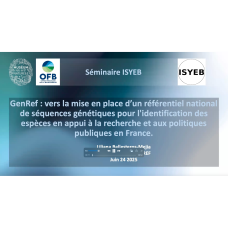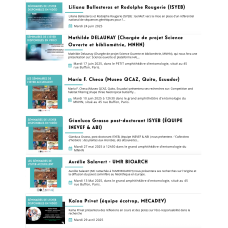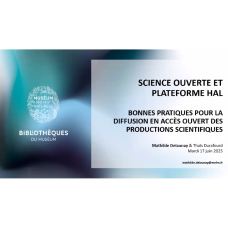Maarten Vanhove du Centre for Environmental Sciences de l’Universiteit Hasselt (Belgique)

L'amphithéâtre Rouelle accueille les séminaires de l'ISYEB tous les mardi

L'amphithéâtre Rouelle accueille les séminaires de l'ISYEB tous les mardi
Research Group Zoology: Biodiversity & Toxicology, Centre for Environmental Sciences, Hasselt University, Diepenbeek, Belgium
More than half of all species on Earth are parasites. This species richness, the interactions with their host (a “living niche”) that lead to unique speciation mechanisms, and their role in host speciation and ecosystem functioning, render parasites excellent model organisms for research on a range of biodiversity-related topics. Nevertheless, parasitological research on cichlids, themselves established model organisms in biodiversity science, is relatively rare. For over a decade, we have been studying monogeneans infecting cichlids in the Congo Basin. These mostly ectoparasitic flatworms are ideal targets in evolutionary parasitology: they only require a single host species throughout their lifecycle and are allegedly quite host-specific, ensuring an often close relationship with their host species.
Some groups of cichlid parasites are more species-rich than their host taxa. Indeed, in Lake Tanganyika, we discovered that cichlid lineages sometimes harbour radiations of host-specific monogeneans. We have described over 40 new species, while co-phylogenetic analyses allowed for hypothesizing which speciation/diversification mechanisms were involved. We also studied the diversity of monogenean cichlid parasites in rivers and small water bodies throughout the Congo Basin, resulting in several species descriptions. Moreover, this served as a baseline to study whether and how this fauna is influenced by the introduction of non-native Nile tilapias, and by pollution. In addition, using Illumina next-generation sequencing technology we sequenced the mitochondrial genomes of some cichlid-infecting monogeneans, offering a resource for phylogenetics and marker development. In summary, this talk strives to offer some perspectives on combining two groups of model organisms in biodiversity science: cichlids and parasites. Given the importance of North-South knowledge transfer, attention will also be devoted to aspects of capacity building.
Vidéo de la présentation accessible ici : http://bit.ly/maartenvanhove



